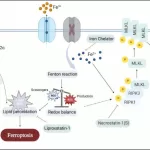A recent study published in the Journal of the Endocrine Society reveals that vigorous workouts may play a significant role in suppressing appetite among healthy adults, with findings suggesting that females may be particularly sensitive to this effect. Led by Dr. Kara Anderson from the University of Virginia, the research highlights the differential impacts of exercise intensity on ghrelin levels—the hormone associated with hunger.
The study focused on the relationship between exercise intensity and ghrelin, which circulates in two forms: acylated ghrelin (AG) and deacylated ghrelin (DAG). While prior research has primarily focused on males, this study aimed to bridge the gap in understanding how exercise intensity affects both men and women.
The research involved eight males and six females, all of whom fasted overnight before engaging in exercises of varying intensities, assessed through blood lactate measurements. Participants then reported their appetite levels post-exercise.
Findings revealed that women had higher baseline levels of total ghrelin compared to men. Notably, only the female participants experienced a significant reduction in AG levels following intense exercise. In contrast, moderate intensity exercise either had no effect on ghrelin levels or resulted in a net increase, suggesting that exercise performed above the lactate threshold may be necessary for ghrelin suppression.
Dr. Anderson stated, “We found that high intensity exercise suppressed ghrelin levels more than moderate intensity exercise. In addition, we found that individuals felt ‘less hungry’ after high intensity exercise compared to moderate intensity exercise.” This points to the potential of high-intensity workouts as a strategy for appetite control, particularly beneficial for weight loss programs.
The research emphasizes the need for further investigation into how exercise impacts appetite across different demographics. “Ghrelin has been shown to have wide-ranging biological effects in areas including energy balance, appetite, glucose homeostasis, immune function, sleep, and memory,” noted Dr. Anderson.
The implications of these findings could influence how exercise is integrated into weight management strategies, with Dr. Anderson suggesting that “exercise should be thought of as a ‘drug,’ where the ‘dose’ should be customized based on an individual’s personal goals.”
The study received financial support from the National Institute of Diabetes and Digestive and Kidney Diseases and the University of Virginia’s School of Education and Human Development. Other contributors to the research include Tana Mardian, Benjamin Stephenson, Emily Grammer, Macy Stahl, Nathan Weeldreyer, and Sibylle Kranz from the University of Virginia; Zhenqi Liu and Kaitlin Love from the University of Virginia Health System; and Jason Allen and Arthur Weltman of the University of Virginia and the University of Virginia Health System.
As the research community continues to explore the complex relationship between exercise, appetite, and hormonal responses, this study adds valuable insights that could shape future health and fitness recommendations.











